Drug Abuse Treatment Issues in Women
Gender Differences in Treatment Needs, Services, Utilization, and Outcomes
Karol A. Kaltenbach, Ph.D.
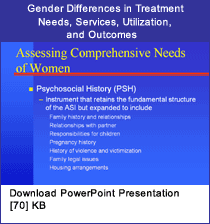 SUMMARY: Dr. Karol Kaltenbach addressed the state of gender-specific, drug abuse treatment availability in the U.S. today. In reviewing the history of women’s special needs and the delineation of treatment strategies during the past 25 years, she has determined that although efforts have resulted in the development of gender-specific treatment models, treatment remains limited. Although programs have been developed to address the addiction, medical, psychosocial, parenting, educational, and vocational needs of women and their children, only 15% of residential programs in the U.S. are for women and only 3% of outpatient programs are for women only.
SUMMARY: Dr. Karol Kaltenbach addressed the state of gender-specific, drug abuse treatment availability in the U.S. today. In reviewing the history of women’s special needs and the delineation of treatment strategies during the past 25 years, she has determined that although efforts have resulted in the development of gender-specific treatment models, treatment remains limited. Although programs have been developed to address the addiction, medical, psychosocial, parenting, educational, and vocational needs of women and their children, only 15% of residential programs in the U.S. are for women and only 3% of outpatient programs are for women only.
|
Treatment Issues in Drug-Dependent Women with Comorbid Depression
Rajita Sinha, Ph.D.
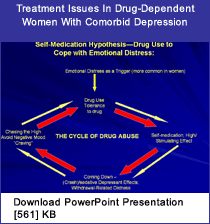 SUMMARY: Dr. Rajita Sinha summarized findings on the effects of major depression and acute stress responses on cocaine relapse in humans, and discussed treatment issues related to comorbid depression and drug abuse. Dr. Sinha presented data on cocaine-dependent men and women participating in inpatient treatment who were evaluated for psychiatric diagnoses, neurobiological responses to stress, and on cocaine relapse during a 90-day postdischarge period. Findings indicated that while men and women are not different in rates of major depression, women with greater neurobiological reactivity to acute emotional stress in the laboratory are significantly more likely to relapse as compared with men. She also discussed pharmacological and psychosocial treatment implications for comorbid depression and drug abuse; specifically, treatments that target stress regulation in comorbid drug-dependent women.
SUMMARY: Dr. Rajita Sinha summarized findings on the effects of major depression and acute stress responses on cocaine relapse in humans, and discussed treatment issues related to comorbid depression and drug abuse. Dr. Sinha presented data on cocaine-dependent men and women participating in inpatient treatment who were evaluated for psychiatric diagnoses, neurobiological responses to stress, and on cocaine relapse during a 90-day postdischarge period. Findings indicated that while men and women are not different in rates of major depression, women with greater neurobiological reactivity to acute emotional stress in the laboratory are significantly more likely to relapse as compared with men. She also discussed pharmacological and psychosocial treatment implications for comorbid depression and drug abuse; specifically, treatments that target stress regulation in comorbid drug-dependent women.
|
Trauma and PTSD: Issues in the Treatment of Drug-Dependent Women
Denise Hien, Ph.D.
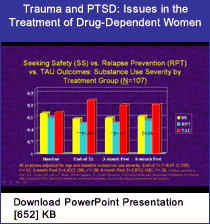 SUMMARY: In her presentation, Dr. Denise Hien reviewed main cognitive behavioral therapy (CBT) approaches that have been empirically examined to treat women with trauma. She focused on findings of one randomized clinical trial comparing two active CBT treatments with a nonrandomized comparison treatment as usual (TAU) condition in a population of substance-abusing urban women with histories of chronic emotional, physical, and sexual abuse, dually diagnosed with PTSD and SUD. Outcomes revealed statistically significant improvements on primary outcome measures for both active treatments compared with the community control group.
SUMMARY: In her presentation, Dr. Denise Hien reviewed main cognitive behavioral therapy (CBT) approaches that have been empirically examined to treat women with trauma. She focused on findings of one randomized clinical trial comparing two active CBT treatments with a nonrandomized comparison treatment as usual (TAU) condition in a population of substance-abusing urban women with histories of chronic emotional, physical, and sexual abuse, dually diagnosed with PTSD and SUD. Outcomes revealed statistically significant improvements on primary outcome measures for both active treatments compared with the community control group.
|
Drug-Dependent Women with Partner Violence: Treatment Issues
Brenda A. Miller, Ph.D.
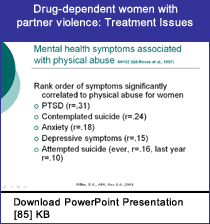 SUMMARY: Dr. Brenda Miller provided an overview of mechanisms by which women’s comorbid disorders—drug/alcohol abuse, depression, anxiety, and PTSD symptoms—are related to partner violence, and gave evidence for bi-directional relationships. She explained how recent findings from a study measuring partner violence, depression and anxiety, and drug and alcohol use among female substance users showed high prevalence of partner violence, other forms of victimization, and depression and anxiety. Not only are relationships between comorbid disorders and partner violence important to consider for comprehensive treatment planning, but also for planning followup for women in treatment. These research findings are important indicators of the connections between comorbid disorders and partner violence and can be used to guide future clinical protocols.
SUMMARY: Dr. Brenda Miller provided an overview of mechanisms by which women’s comorbid disorders—drug/alcohol abuse, depression, anxiety, and PTSD symptoms—are related to partner violence, and gave evidence for bi-directional relationships. She explained how recent findings from a study measuring partner violence, depression and anxiety, and drug and alcohol use among female substance users showed high prevalence of partner violence, other forms of victimization, and depression and anxiety. Not only are relationships between comorbid disorders and partner violence important to consider for comprehensive treatment planning, but also for planning followup for women in treatment. These research findings are important indicators of the connections between comorbid disorders and partner violence and can be used to guide future clinical protocols.
|
Drug Treatment Issues in Drug-Dependent, Pregnant Women
Hendrée E. Jones, Ph.D.
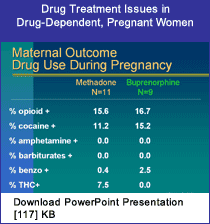 SUMMARY: Methadone is currently the recommended standard of care for opioid-dependent pregnant women, improving maternal and neonatal outcomes when provided as a part of a comprehensive care model. However, methadone treatment during pregnancy remains controversial. Dr. Hendrée Jones’ presentation aimed to dispel myths and provide evidence-based recommendations for the appropriate use of methadone during pregnancy. Jones also recognizes the need for information on the safety and efficacy of buprenorphine, the latest opioid pharmacotherapy to be approved for the treatment of opioid dependence in nonpregnant patients. Jones provided the latest results from a double-blind, randomized, controlled trial comparing methadone and buprenorphine in the treatment of opioid-dependent pregnant women and the effects of prenatal exposure to these medications on the neonate. Novel behavioral approaches examined in the context of methadone and comprehensive care were also presented.
SUMMARY: Methadone is currently the recommended standard of care for opioid-dependent pregnant women, improving maternal and neonatal outcomes when provided as a part of a comprehensive care model. However, methadone treatment during pregnancy remains controversial. Dr. Hendrée Jones’ presentation aimed to dispel myths and provide evidence-based recommendations for the appropriate use of methadone during pregnancy. Jones also recognizes the need for information on the safety and efficacy of buprenorphine, the latest opioid pharmacotherapy to be approved for the treatment of opioid dependence in nonpregnant patients. Jones provided the latest results from a double-blind, randomized, controlled trial comparing methadone and buprenorphine in the treatment of opioid-dependent pregnant women and the effects of prenatal exposure to these medications on the neonate. Novel behavioral approaches examined in the context of methadone and comprehensive care were also presented.
|
|